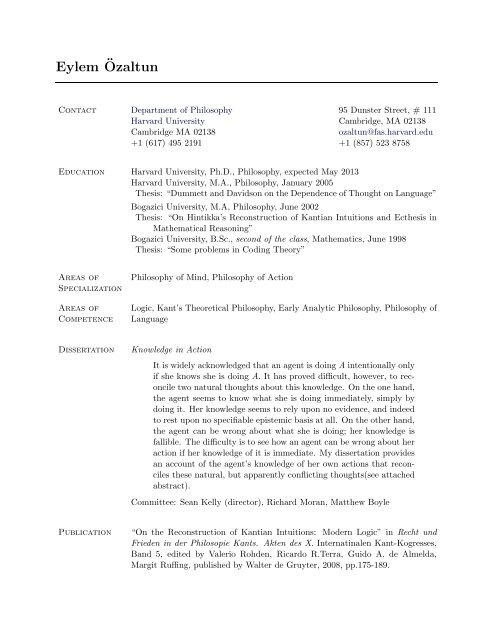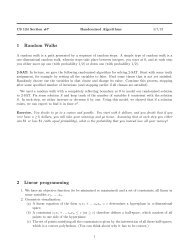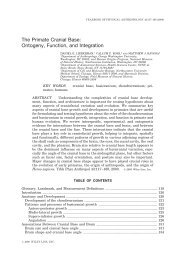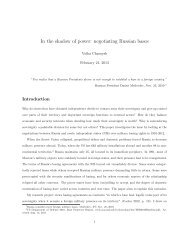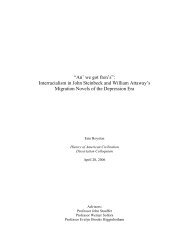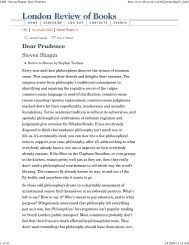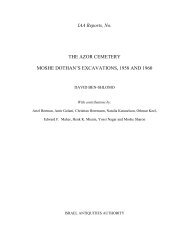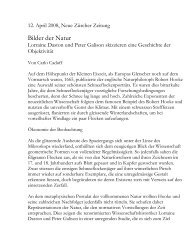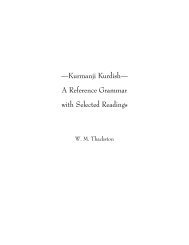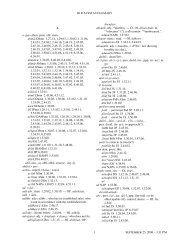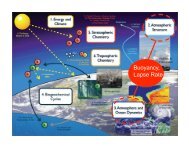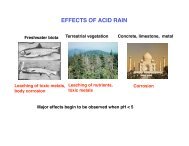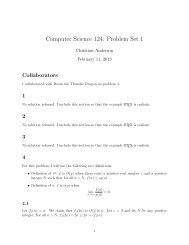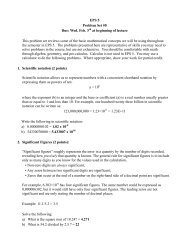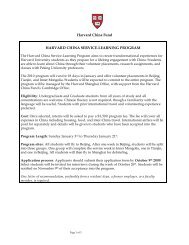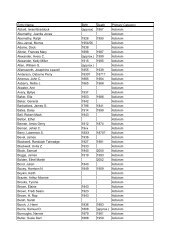Eylem¨Ozaltun - Harvard University
Eylem¨Ozaltun - Harvard University
Eylem¨Ozaltun - Harvard University
You also want an ePaper? Increase the reach of your titles
YUMPU automatically turns print PDFs into web optimized ePapers that Google loves.
Eylem Özaltun<br />
Contact<br />
Education<br />
Areas of<br />
Specialization<br />
Department of Philosophy<br />
<strong>Harvard</strong> <strong>University</strong><br />
Cambridge MA 02138<br />
+1 (617) 495 2191<br />
95 Dunster Street, # 111<br />
Cambridge, MA 02138<br />
ozaltun@fas.harvard.edu<br />
+1 (857) 523 8758<br />
<strong>Harvard</strong> <strong>University</strong>, Ph.D., Philosophy, expected May 2013<br />
<strong>Harvard</strong> <strong>University</strong>, M.A., Philosophy, January 2005<br />
Thesis: “Dummett and Davidson on the Dependence of Thought on Language”<br />
Bogazici <strong>University</strong>, M.A, Philosophy, June 2002<br />
Thesis: “On Hintikka’s Reconstruction of Kantian Intuitions and Ecthesis in<br />
Mathematical Reasoning”<br />
Bogazici <strong>University</strong>, B.Sc., second of the class, Mathematics, June 1998<br />
Thesis: “Some problems in Coding Theory”<br />
Philosophy of Mind, Philosophy of Action<br />
Areas of Logic, Kant’s Theoretical Philosophy, Early Analytic Philosophy, Philosophy of<br />
Competence Language<br />
Dissertation<br />
Publication<br />
Knowledge in Action<br />
It is widely acknowledged that an agent is doing A intentionally only<br />
if she knows she is doing A. It has proved difficult, however, to reconcile<br />
two natural thoughts about this knowledge. On the one hand,<br />
the agent seems to know what she is doing immediately, simply by<br />
doing it. Her knowledge seems to rely upon no evidence, and indeed<br />
to rest upon no specifiable epistemic basis at all. On the other hand,<br />
the agent can be wrong about what she is doing; her knowledge is<br />
fallible. The difficulty is to see how an agent can be wrong about her<br />
action if her knowledge of it is immediate. My dissertation provides<br />
an account of the agent’s knowledge of her own actions that reconciles<br />
these natural, but apparently conflicting thoughts(see attached<br />
abstract).<br />
Committee: Sean Kelly (director), Richard Moran, Matthew Boyle<br />
“On the Reconstruction of Kantian Intuitions: Modern Logic” in Recht und<br />
Frieden in der Philosopie Kants. Akten des X. Internatinalen Kant-Kogresses,<br />
Band 5, edited by Valerio Rohden, Ricardo R.Terra, Guido A. de Almelda,<br />
Margit Ruffing, published by Walter de Gruyter, 2008, pp.175-189.
Fellowships The Star Family Prize for Excellence in Advising, <strong>Harvard</strong> <strong>University</strong> (nomiand<br />
Awards nated, expected May 2013)<br />
Graduate Society Dissertation Completion Fellowship, <strong>Harvard</strong> <strong>University</strong>, 2011-<br />
2012<br />
Richard M. Martin Prize Fellowship, Department of Philosophy, <strong>Harvard</strong> <strong>University</strong>,<br />
2010-2011<br />
Travel grant for The nature of practical intelligence Workshop at Wissenschaftskolleg<br />
zu Berlin, 28-30 May 2009, Department of Philosophy, <strong>Harvard</strong> <strong>University</strong><br />
Grant for language study in Munich, Germany, Philosophy Department, <strong>Harvard</strong><br />
<strong>University</strong>, 2007<br />
The Jens Aubrey Westengard Fund Travel Grant 2005, 2006<br />
Graduate Student Prize Fellowship, <strong>Harvard</strong> <strong>University</strong> 2002-2007<br />
Travel and tuition grant for VISU 2001, Institut Wiener Kreis, Austria<br />
Honor Student, Department of Mathematics, Bogazici <strong>University</strong>, 1996-1998<br />
Papers<br />
Presentations<br />
abstracts provided below<br />
“Intention §45” (draft)<br />
“Knowledge in Action and First-person Reference” (draft)<br />
“Self-knowledge as the Condition of Representation in General” (in preparation)<br />
“On Velleman on the Efficacy of Practical Knowledge” Metaphysics and Epistemology<br />
Workshop, <strong>Harvard</strong> <strong>University</strong>, January, 2012<br />
“The World-involvingness of Practical Knowledge” Metaphysics and Epistemology<br />
Workshop, <strong>Harvard</strong> <strong>University</strong>, March 2011<br />
“Non-cognitivism and the Critique of traditional Metaphysics in Wittgenstein<br />
and Heidegger”, invited presentation, <strong>Harvard</strong> Workshop in European<br />
Philosophy, December 2010<br />
“Practical Thought and I-talk” Metaphysics and Epistemology Workshop, <strong>Harvard</strong><br />
<strong>University</strong>, September 2010<br />
“On whether “I” refers” Metaphysics and Epistemology Workshop, <strong>Harvard</strong><br />
<strong>University</strong>, March 2010<br />
“Intention §45” Workshop in Moral and Political Philosophy, <strong>Harvard</strong> <strong>University</strong>,<br />
December 2009<br />
“How do I know that I am doing something when I know that by doing it?”<br />
Metaphysics and Epistemology Workshop, <strong>Harvard</strong> <strong>University</strong>, March 2009<br />
“On Moran on Anscombe on Practical Knowledge” Metaphysics and Epistemology<br />
Workshop, <strong>Harvard</strong> <strong>University</strong>, November 2008<br />
“Are explanations of action by reasons causal explanations?” Metaphysics and
Teaching<br />
Experience<br />
Epistemology Workshop, <strong>Harvard</strong> <strong>University</strong>, November 2007<br />
“John McDowell on Second Nature” invited presentation, Professor Martha<br />
Nussbaums seminar on Virtue Ethics, March 2007<br />
“Operativeness of reason in receptivity: Rationality as second nature” Metaphysics<br />
and Epistemology Workshop, <strong>Harvard</strong> <strong>University</strong>, November 2006<br />
“Is Language Necessary for Thought?” refereed International Conference on<br />
Philosophy of Athens Institute for Education and Research, June 2006<br />
“Where do Davidson and Burge disagree?” Metaphysics and Epistemology<br />
Workshop, <strong>Harvard</strong> <strong>University</strong>, May 2006<br />
“On the Reconstruction of Kantian Intuitions in Modern Logic.”refereed 10th<br />
International Kant Congress in Sao Paulo, Brazil, September 2005<br />
“Dummett and Davidson on the Dependence of Thought on Language” Metaphysics<br />
and Epistemology Workshop, <strong>Harvard</strong> <strong>University</strong>, March 2005<br />
“Is Freges Logic Synthetic in Kant’s Sense?” Vienna International Summer<br />
<strong>University</strong>(VISU)Scientific World Conceptions, ”Unity and Plurality in<br />
Science”, June 2001<br />
“On the analytic/synthetic distinction in Kant and Frege” Middle East Technical<br />
<strong>University</strong>, Ankara, Turkey, May 2000<br />
Full Responsibility at <strong>Harvard</strong> <strong>University</strong><br />
Moral Psychology in Plato’s Republic<br />
Aristotle and Anscombe on Action<br />
Anscombe’s Intention<br />
Teaching Fellow at <strong>Harvard</strong> <strong>University</strong><br />
Philosophy 139x: Heidegger: Being and Time (Instructor: Sean D. Kelly)<br />
Phil 129 : Kants Theoretical Philosophy (Instructor: Matthew Boyle)<br />
Phil 144: Logic and Philosophy (Instructor: Warren Goldfarb)<br />
Phil 137: The Later philosophy of Wittgenstein (Instructor: Warren Goldfarb)<br />
MR66 : Are there moral truths? (Instructor: Niko Kolodny)<br />
Quantitative Reasoning 22 (Instructor: Richard Heck)<br />
Teaching Assistant at Bogazici <strong>University</strong><br />
Calculus I and II for Math Majors
Sample<br />
Courses<br />
Prepared to<br />
Teach<br />
Calculus I and II for Engineers)<br />
Introduction to Mathematical Structures for Math Majors<br />
Set Theory for Math Majors<br />
Graduate Self-Reference and Self-Consciousness, Disjunctivism in Perception<br />
and Action, Philosophy of Action, Philosophy of Mind, Practical and Theoretical<br />
Reason Distinction<br />
Advanced Undergraduate Kant’s Critique of Pure Reason, Philosophy of<br />
Language; Logic (through incompleteness theorems), Early and Late Philosophy<br />
of Wittgenstein, History of Early Analytic Philosophy, Moral Psychology,<br />
Epistemology, Metaphyiscs<br />
Introductory History of Modern Philosophy, Introduction to Philosophical<br />
Problems, Introduction to Ethics<br />
Graduate<br />
Coursework Taken for Credit<br />
The Later Philosophy of Wittgenstein Warren Goldfarb<br />
Intensinal Logic Chales Parsons<br />
Philosophy of Mathematics Charles Parsons<br />
Seminar on Kant’s Critique of Pure Reason Charles Parsons<br />
Seminar on Leibniz Don Rutherford<br />
Aristotle Raphael Woolf<br />
Kant’s Ethical Theory Christine Korsgaard<br />
The Ethical Thought of Hume Christine Korsgaard<br />
Philosophy of Language: Meaning and Communication Richard Heck<br />
Sense and Reference Richard Heck<br />
First year colloquium Richard Heck/ Alison Simmons<br />
Audited<br />
Aristotle’s Ethics and Politics Gisela Striker<br />
Kant’s Critique of Pure Reason Charles Parsons<br />
Seminar on Philosophy of Action Christine Korsgaard<br />
Seminar on Self-Consciousness and Self-Knowledge Matthew Boyle<br />
Seminar on Evolution and Cognition Peter Godfrey-Smith<br />
Rationality and Irrationality Matthew Boyle<br />
Seminar on Philosophy of Psychology Charles Travis<br />
Frege Peter Hylton<br />
Seminar on Topics in Philosophy of Language Richard Heck<br />
Seminar on Wittgenstein Warren Goldfarb<br />
Seminar on Quine Warren Goldfarb<br />
Seminar on Wittgenstein’s Tractatus Warren Goldfarb<br />
Seminar on Ethics and Action Doug Lavin & Matthew Boyle<br />
Seminar on Virtue Ethics Martha Nussbaum
Employment<br />
and Academic<br />
Service<br />
Miscellaneous<br />
References<br />
Resident Tutor Kirkland House, <strong>Harvard</strong> <strong>University</strong>, August 2008-present<br />
Sophomore Advisor: I serve as the academic advisor to sophomore students, I<br />
help them to choose a concentration, prepare a study plan toward concentration<br />
declaration and sign their study cards<br />
Philosophy Tutor: I work with Philosophy concentrators in the house helping<br />
them with their course work, and graduate school applications<br />
Drama tutor: I serve as the advisor to the drama society overseeing two productions<br />
per academic year<br />
Intern RWTH Aachen, Germany, Summer 2008<br />
I translated the university website from German to English<br />
Administrative Assistant to Professor Christine Korsgaard, Spring 2008<br />
Philosophy Department Representative <strong>Harvard</strong> <strong>University</strong> Mind/Brain/Behaviour<br />
Initiative Graduate Steering committee, 2006-2007<br />
Co-organizer 2007 MBB Graduate Student Conference: ”Finding Perfection:<br />
Perspectives on Optimality from Mind, Brain and Behavior”<br />
http://mbb.harvard.edu/grad/gradstudentconf.php<br />
Coach undergraduate MBB concentrators thesis presentations, 2006-2007<br />
Private tutor in Mathematics for students with learning disabilities, 2000-2002<br />
Languages: Turkish (native), German (research)<br />
Sean Kelly (sdkelly@fas.harvard.edu)<br />
Professor of Philosophy, <strong>Harvard</strong> <strong>University</strong><br />
Richard Moran (moran@fas.harvard.edu)<br />
Brian D. Young Professor of Philosophy, <strong>Harvard</strong> <strong>University</strong><br />
Matthew Boyle (boyle2@fas.harvard.edu)<br />
Professor of Philosophy, <strong>Harvard</strong> <strong>University</strong><br />
Warren Goldfarb (gorlfarb@fas.harvard.edu)<br />
Walter Beverly Pearson Professor of Modern Mathematics and Mathematical<br />
Logic, <strong>Harvard</strong> <strong>University</strong><br />
Martha Nussbaum (martha nussbaum@law.uchicago.edu)<br />
Ernst Freund Distinguished Service Professor of Law and Ethics, <strong>University</strong> of<br />
Chicago<br />
Charles Travis (c.s.travis@gmail.com)<br />
Professor of Philosophy, King’s College London
Dissertation<br />
Abstract<br />
Knowledge in Action<br />
It is widely acknowledged that one feature that distinguishes intentional actions<br />
from other events in the life of an agent is the agent’s special epistemic status<br />
with respect to them. Though we often know with remarkable accuracy what a<br />
person is doing by observing her, when observing her movements is not enough,<br />
we ask “what are you doing?” We expect the agent to know what she is doing;<br />
moreover we expect her to know already, that is, without needing to find out.<br />
Yet how can the agent know contingent facts about the world beyond her own<br />
mind immediately, without observation or inference? Our claims about what we<br />
are doing are clearly fallible: what then entitles us to our normal presumption<br />
that we can speak on this topic without needing to verify that our claims are<br />
true?<br />
In the face of this difficulty, many philosophers distinguish two objects of knowledge<br />
in action: the object of immediate knowledge, which is supposed to be<br />
something interior, and what the agent actually does, which is only known mediately.<br />
Different philosophers take different things to be the object of immediate<br />
knowledge: intention, trying, the description under which my action is intentional,<br />
etc. Moreover, there is disagreement about how the object of immediate<br />
knowledge relates to the object of mediate knowledge: some claim that we know<br />
these two objects in two independent ways, while others seek to show how we<br />
can know the latter on the basis of our knowledge of the former. Nevertheless,<br />
I argue, this common assumption is shared by many different action theorists:<br />
that the object of immediate agential knowledge is not what the agent actually<br />
does.<br />
In my dissertation, I argue that this two-factor framework is unacceptable. I<br />
show that the two-factor framework cannot account for the insight which motivated<br />
the study of intentional action via the agent’s knowledge of these actions:<br />
that it is in virtue of this specific way of knowing that the agent is the agent<br />
of her intentional actions. I argue that it should be a condition of adequacy<br />
on an account of agent’s knowledge of her own actions that it clarifies how this<br />
knowledge contributes to our capacity for agency. I go on to propose an account<br />
of knowledge in action that saves the phenomena we noted above: it allows us<br />
to recognize a way of knowing that is (i) concerned with what the agent actually<br />
does, (ii) immediate, and (iii) fallible.<br />
Whereas the two-factor framework distinguishes two objects of which the agent<br />
has knowledge, I defend a view on which there is only one object known—what<br />
the agent actually does—but two modes of awareness that contribute to this<br />
knowledge. I show that acting itself, in its own right, is a way of knowing how<br />
things are, and therefore that the agent can know what actually happens when<br />
she acts simply by acting, with no need for further epistemic work. I argue<br />
that the agent’s immediate knowledge of her own actions can be accounted for<br />
by a certain “transparency” in action-awareness: although an agent’s primary<br />
awareness is of what she is pursuing—her goal and the steps that must be taken<br />
to achieve it—she is aware of these things in a way that permits her, on reflection,<br />
to recognize that she engaged in the pursuit of this goal. It is this awareness
Abstracts of<br />
Individual<br />
Papers<br />
the agent makes explicit to herself and others in a report like “I am doing A”<br />
when prompted by the question “What are you doing?” Moreover, I argue that<br />
this immediate knowledge is no obstacle to fallibility: just as my perceptions<br />
are available to me immediately, but constitute knowledge only if I perceive<br />
successfully, so my actions are available to me immediately, but “I am doing A”<br />
expresses knowledge only if I act successfully, that is, only if I am actually doing<br />
A.<br />
This account of knowledge in action also allows us to clarify the connection between<br />
this knowledge and the capacity for agency itself. To know one’s actions is,<br />
on my account, to be aware of the world actingly. The reason that is involved in<br />
action is thus not aimed at depicting what is happening but at doing what makes<br />
sense, and in this respect, it is practical. That is why the relevant reasoning in<br />
question is means-end reasoning, the kind of reasoning that guides the action in<br />
the pursuit of an end. The efficacious knowledge in action is the understanding<br />
of the kind of action the agent set herself to bring about. For example, if the<br />
action is building a house, the efficacious knowledge is the agent’s understanding<br />
of the concept house in such a way that he can produce an instance of it here<br />
and now. I argue that it is by exercising this general knowledge the agent settles<br />
the particulars of this house that she is building here and now. If all goes well,<br />
this general knowledge determines the activity of building and exhausts itself in<br />
the construction of a particular house. So it is through an exercise of productive<br />
knowledge of the general one knows what one is doing on particular occasions.<br />
Moreover, the practical and goal-oriented character of this guiding knowledge<br />
also explains the agent’s ability to not only know what she is doing but also why<br />
she is doing what she is doing. Thus we can say that acting intentionally is not<br />
acting and also knowing that one is acting, but rather exercising one’s power to<br />
know in making something tangible happen.<br />
“Intention §45” (draft)<br />
On the basis of the fourth paragraph of §45, several commentators have claimed<br />
that practical knowledge is non-factive. Some other commentators have tried<br />
to avoid this reading by claiming that the object of practical knowledge is independent<br />
of what actually takes place, and therefore practical knowledge implies<br />
truth but of something short of what happens. I think none of these options<br />
fits well with the central claims of Anscombe’s Intention. I provide a reading<br />
of §45 by which we can resist the idea that practical knowledge is of some interior<br />
thing which is short of what is happening while also rejecting the idea<br />
that there can be knowledge without truth or fallibility. I argue that according<br />
to Anscombe, we have practical, non-observational knowledge of what happens<br />
when what happens is our intentional doing. When what we think we are doing<br />
is not what happens, we do not have knowledge.
“Knowledge in Action and First-person Reference” (draft)<br />
In this paper I explore the consequences of my account of the agent’s knowledge<br />
of her own actions for the semantic analysis of the first person action sentences.<br />
I further argue that the semantic structure we discover in the first person action<br />
sentences can be extended to all I-talk. Along the way I provide a new take on<br />
the debate on whether “I” refers, and a novel interpretation of Wittgenstein’s<br />
object-subject use of “I” distinction that challenges the dominant view that the<br />
distinction is meant to isolate the phenomenon coined as “immunity to error<br />
through misidentification” by Shoemaker.<br />
“Self-knowledge as the Condition of Representation in General”(in preparation)<br />
According to the analysis I give in my dissertation, practical knowledge is a<br />
way of knowing objective reality in its own right by being the author of it.<br />
This points to a very different relationship between the knower and the known<br />
compared to the relationship characteristic of observational knowledge. In this<br />
paper I investigate this relationship to expose practical knowledge as a form<br />
of self-knowledge. By reflecting on the peculiarities of the use of first person<br />
pronoun “I” in general, I explore whether some important aspects of practical<br />
knowledge as self-knowledge in action can be extended to the whole self-thought<br />
towards an understanding of what self-consciousness is in both its theoretical<br />
and practical guises. I start by defending the view that the reflective capacities<br />
are not invoked in action to give a reflexive representation of the agent herself as<br />
acting, and generalize this view to a characterization of self-consciousness not as<br />
reflexive consciousness but as the form of our human consciousness in general.<br />
In other words, our ability to have self-knowledge will turn out to be not the<br />
ability to represent ourselves among other objects of knowledge. Instead, it will<br />
be portrayed as the very condition of representing or doing anything in the first<br />
place.


